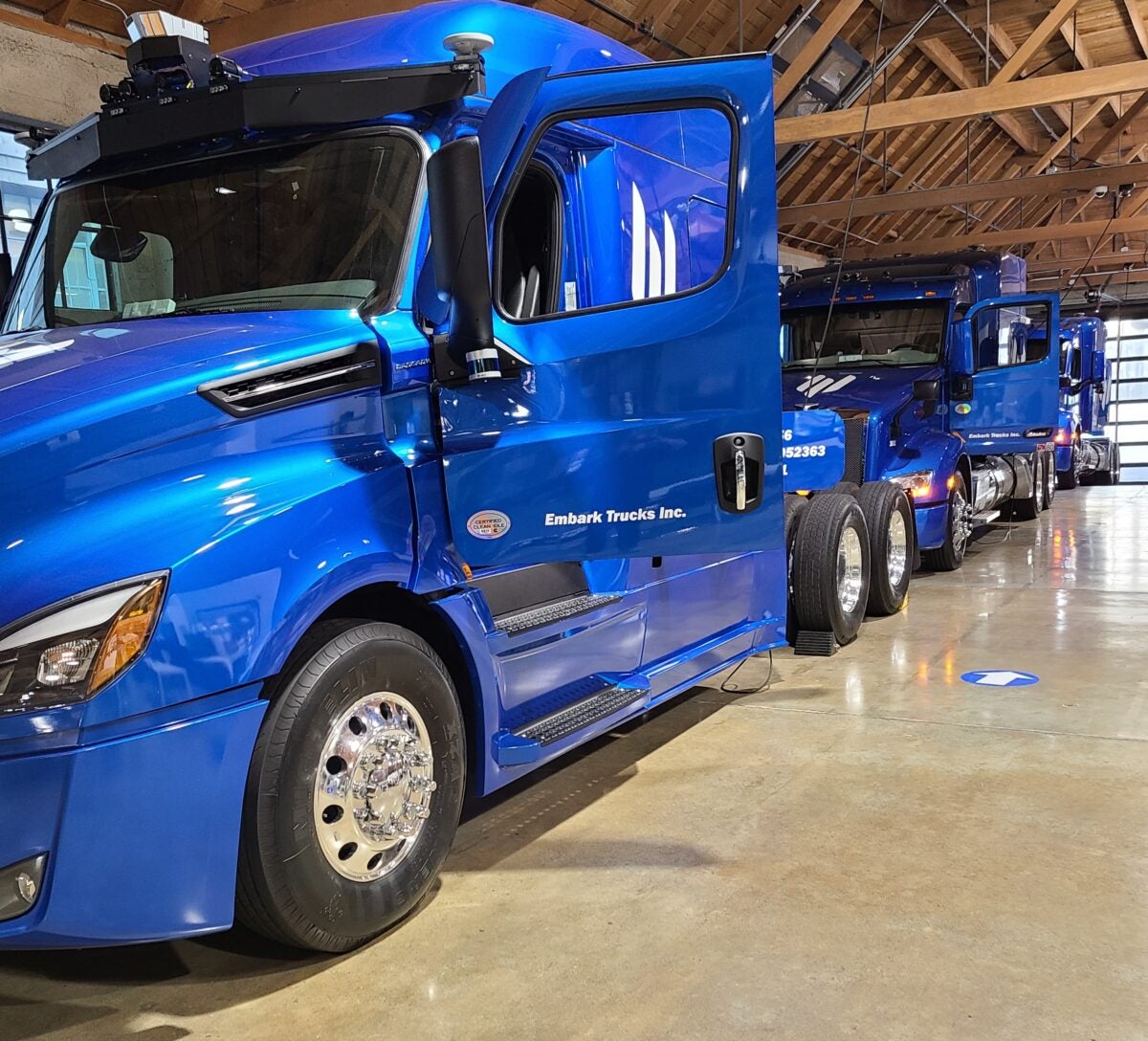Editor’s Note: CORRECTS lead to say Embark would make significant progress toward rather than exceed first-year revenue target and names of carriers placing orders.
SPAC-sponsored autonomous trucking software developer Embark Trucks expects to make significant progress toward its first-year revenue target based on 14,200 reservations it has collected from partner carriers including Knight-Swift Transportation Holdings and Mesilla Valley Transportation.
The reservations more than double the 6,775 reservations that competitor TuSimple Holdings reported through the second quarter for the autonomous International LT Class 8 truck it is developing with Navistar. TuSimple took a $500 deposit on each reservation. Embark is doing likewise with fully refundable $500 deposits. Financially invested partners are exempt.
The Embark reservations covering 2024-2028 are nonbinding, but if they convert to contracts, Embark would have achieved a significant portion of its first year revenue goal of $867 million.

Embark’s Universal Interface software is compatible with Freightliner, Volvo, Peterbilt and International trucks. It is intended for driverless operation in 2024 on predetermined routes in Sunbelt states chosen by its potential customers. Embark Driver will operate in the lower U.S. for 2024 and 2025 and expand to the 48 contiguous states in 2026.
Embark is moving toward fleets being able to spec any of the four major brands with Embark Driver software and has established partnerships for the critical components that enable integration through collaborations with Cummins, ZF and NVIDIA.
‘Finite set of units’
“Suppliers for key Embark Universal Interface components such as sensors, compute and interfaces will only be able to provide a finite set of units in the early years, and OEMs will only be able to integrate so many trucks in the early years,” Sam Abidi, Embark’s director of business development, told FreightWaves.
“We want this limited capacity in the hands of our early fleet partners who are best equipped to utilize it.”
Embark’s carrier partners include Knight-Swift (NYSE: KNX), Werner Enterprises (NASDAQ: WERN), Bison Transport and Mesilla Valley. Embark needs 6,500 trucks averaging 360,000 miles of autonomous driving in 2024 to hit is goal, according to its June 23 investor deck.
The trucks, if purchased with Embark software, represent a projected 10 billion billable Embark Driver miles over their lifetimes. Embark needs 2.4 billion billable miles in 2024 to reach its revenue goal. Miles sold by subscription will be billed at 31 cents and 38 cents depending on the length of haul.
‘Improving the driving job’
“There is a strong case for early deployment of Embark’s technology in key segments of our network, where it can be used as a tool to provide critical safety enhancements for our drivers and ultimately work towards the goal of improving the driving job,” said Dave Jackson, CEO of Knight-Swift and an Embark Advisory Board member.
“There is a strong case for early deployment of Embark’s technology in key segments of our network, where it can be used as a tool to provide critical safety enhancements for our drivers and ultimately work towards the goal of improving the driving job.”
Dave Jackson, CEO of Knight-Swift
Knight-Swift is also an investor in a $200 million private investment in public equity (PIPE) that is part of a pending merger of Embark with Northern Genesis Acquisition Corp. II, a special purpose acquisition company created to merge with a startup. Northern Genesis previously completed a SPAC merger with Canadian electric bus and truck maker Lion Electric.
“Our management team has worked closely with Embark to weigh the unique benefits in speed, cost and sustainability against the operational and technical hurdles of deployment at a lane level, enabling Knight-Swift to accurately prioritize the network segments where this technology could deliver the most value and place reservations against this plan,” Jackson said.
The reservations for the Embark Driver software followed strategic planning, operational evaluation and autonomous commercial hauling, Embark said in a press release.
Billions of miles analyzed
Embark and its partners analyzed billions of miles across millions of loads at the lane level to determine the incremental benefits that autonomous trucks can deliver across cost savings, speed, sustainability and safety.
For example, a 600-mile automated run would generate much bigger savings than a 500-mile trip, which could be completed within the allowable 11 hours of driving in federal hours of service guidelines. To complete the extra 100 miles would require a mandatory 10-hour rest break for a human driver and ultimately take 22 hours to complete.
An autonomous truck traveling the 600 miles would save fuel, deliver its load sooner and improve fuel efficiency by eliminating overnight idling.
“With these reservations, Embark is providing a competitive advantage to fleet partners who have invested the time and energy in preparing to deploy first,” said Embark CEO Alex Rodrigues.
“In just a few years, our partners will be able to operate with a next-generation product that is safer, more efficient and more sustainable, enabling them to utilize autonomous trucks to grow their business while retaining their existing driver workforce to serve on shorter routes,” Rodrigues said.
Related articles:
Real-world autonomy: Navigating a traffic jam and a crash scene
Embark Trucks taps industry advisers on path to commercialization
Embark Trucks recruits partners to build autonomous driving ecosystem








.
Is this a joke?
Let me get this straight. These partner carriers that invested in Embark placed a lot of truck reservations to make Embarks numbers look better and the total enterprise value of their investment go up yet all those reservations are completely non binding reservations and no deposit money at all was required.
Why not ‘order’ 10,000,000,000,000,000 units. Lordstown motors and Nikola are in big SEC trouble and face class action lawsuits for similar actions.